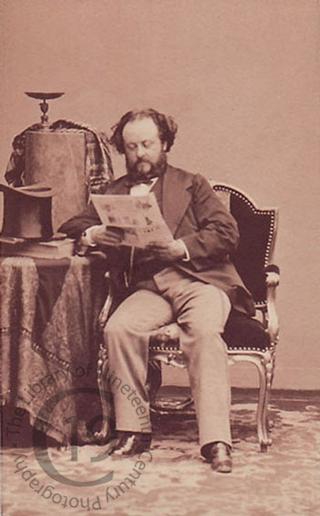
Gustave Roger
A carte-de-visite portrait of the French tenor Gustave Roger (1815-1879).
According to his obituary, which appeared in the Times on 22 September 1879: ‘Gustave Roger, the distinguished tenor singer, whose was death was announced by The Times last week, was born in 1815. His father was a notary and resided in the Faubourg St. Denis, but he died while Gustave was a mere child. His uncle and guardian, who was a member of the Chamber of Deputies, wished to bring the lad up for the Bar, but he showed such a decided inclination for the stage and for singing, that it was thought better to yield to what seemed a manifest vocation, and he was sent to the Paris Conservatoire for his musical education. He quitted that establishment in 1837 laden with honours and prizes, and he made his début the following year in a comic opera of Auber’s. He quickly appeared in various parts in operas by Boieldieu, Herold, Auber, Adam; his performance especially in Halévy’s Mousquetaires de la Reine constituting him a prime favourite with the public, and showing that the French stage had at last obtained the long-coveted gift of a genuine tenor singer. When in 1848 Meyerbeer at last resolved to intrust the bringing out of his Prophète to the Grand Opéra, he selected Roger for the part of John of Leyden. This was the French tenor’s first introduction to a field which was in many ways different from that which he had been accustomed to, and more difficult to master. But his success was unqualified, and he added to his former parts those of Raoul in the Huguenots, Edgar in Lucia, and others from leading Italian operas, besides increasing his répertoire in French opera. The ill-success of Niedermayer’s Fronde, combined with various unpleasantnesses which he had been, or fancied he had been, experiencing for some time at the establishment in the Rue Lepelletier, determined him to carry out a project which he had long meditated, and he quitted the Paris Opera-house and undertook a professional tour through Germany, Austria, and Russia. He had already visited this country in 1849 with Madame Jenny Lind. His tour was most successful. People admired him almost equally in comic as in tragic parts. And although his voice never gained in strength and had not the volume which others have possessed, he was always the great and conscientious artist, whose performances were models upon which rising candidates for fame might form themselves. In 1859, as already mentioned in the brief announcement of his death, while fowling at his country place, Lalande, near Paris, his gun exploded, lodging contents in his arm, which had to be amputated. A few days before, while acting in the opera of Herculaneum, his voice showed signs of weakness. He procured an artificial arm, and by hard training succeeded wonderfully in mastering the difficulties of its use; but he soon became convinced his career was over. His last appearance in Paris was a performance founded on George Sand’s Cadio. His Paris residence was in Avenue Frochot, where he had singing classes and gave lessons. He was a constant frequenter of the opera-houses, watching with intense interest the successors who appeared in the various rôles in which he was once so popular. He did not conceal his opinion of the decadence of the modern opera. During his various visits to Germany he had met with a warm and even enthusiastic reception, and he was duly grateful. But the events of 1870-71 quite changed his feelings, and of late years no one in Paris was more hostile to everything German than Roger. He suffered for a long time past from diabetes and insufficiency of blood. He sometimes suffered acutely, and was relieved by subcutaneous injections of morphine. He became himself quite an adept in performing the necessary operation, and his friends, fearing an accident, induced the apothecary to dilute the preparation excessively. Yet, such was the force of imagination, Roget used to declare that he experienced great relief from the use of what was practically only water. His end was painless. He leaves a widow advanced in age.’
Photographed by Disdéri of Paris.
Code: 123073




